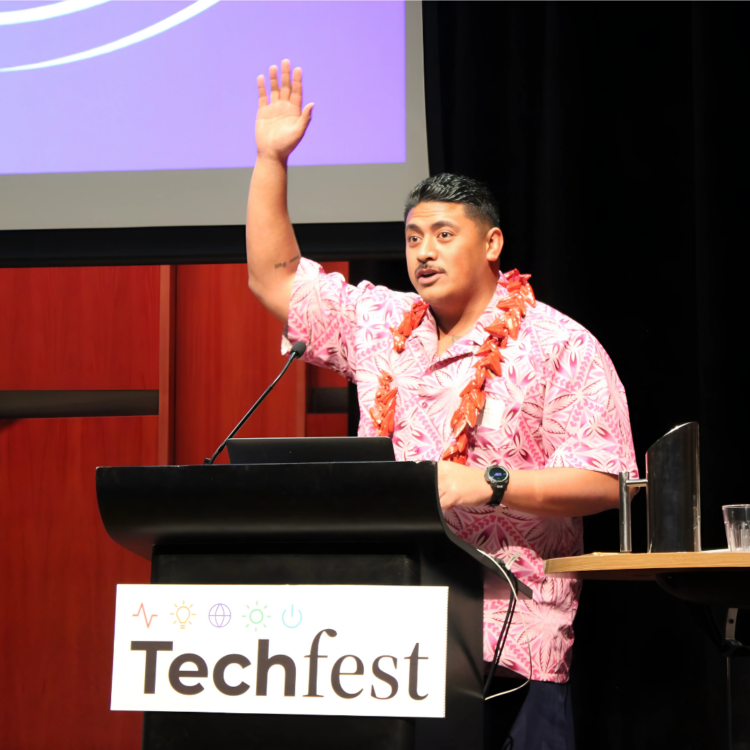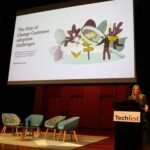Building Equitable Pathways into New Zealand’s Tech Future


At Canterbury Tech’s recent TechFest event, three passionate advocates delivered a powerful message about digital equity and the tech industry’s responsibility to create pathways for all New Zealanders. Karen Haigh from Christchurch NZ, Elle Archer from Te Hapori Matihiko, and Poasa Alaifea from Tagata Moana Trust shared insights and personal stories that highlighted both the challenges and opportunities in building a more inclusive tech sector.
The Reality of Digital Inequality
The statistics paint a clear picture of the current landscape. As Karen Haigh pointed out, “At secondary schools in New Zealand, 50% of students are female, 21% are Māori and 5% are Pacific Peoples. But in degree level tech programmes, that drops to just 24% women and under 5% for Māori and Pacific Peoples.”
This dramatic drop represents more than just numbers—it reflects systemic barriers that prevent many young New Zealanders from seeing technology as a viable career path. The gap continues into the workforce, creating a tech industry that doesn’t reflect the diversity of our communities.
Barriers Beyond Perception
“Our digital future starts with access and it starts with aspiration,” explained Ellie Archer. “If we want a thriving tech sector in Ōtautahi and in Waitaha in general, we need to make sure our people can see themselves in it. That means equity isn’t just a value, it’s a strategy.”
The barriers extend beyond perception to practical realities. Poasa shared a powerful example of a household with 13 individuals living in a three-bedroom home, where four students studying NCEA had to share a single device—a parent’s mobile phone. Without access to laptops or desktops, these students faced significant disadvantages in their education and future career prospects.
This example vividly illustrates the digital divide that exists in many communities. It’s not just about having a device; it’s about having adequate access to technology that supports learning and growth. For these students, sharing a single mobile phone means limited time for each person to complete assignments, research, or engage in online learning opportunities. It also means potential conflicts over device usage, added stress in managing study time, and difficulties in participating in increasingly digital classroom environments.
Moreover, this situation highlights the broader implications of the digital divide. Students without proper access to technology at home may fall behind their peers, not just in tech-related subjects, but across all areas of study. They may miss out on developing crucial digital literacy skills that are becoming essential in nearly every career path. This disadvantage can have long-lasting effects on their educational outcomes and future career prospects, perpetuating cycles of inequality.
Addressing this issue requires more than just providing devices. It calls for comprehensive solutions that include reliable internet access, digital literacy training for both students and parents, and ongoing support to ensure that technology remains accessible and useful. By sharing this example, Poasa underscored the urgent need for industry involvement in bridging the digital divide and inspiring the next generation of tech talent, making it clear that tech companies have a crucial role to play in creating more equitable access to technology and, by extension, to future opportunities in the tech sector.
A Call to Industry Action
“Some people start life here and some people start life here. It is our equal responsibility to narrow this gap,” Poasa emphasised repeatedly throughout his presentation, highlighting the tech industry’s crucial role in creating change.
The speakers outlined several practical ways tech companies can contribute:
- Offer time and access for staff to act as speakers and mentors in schools or at events for young people
- Donate no-longer-used but functional devices to organisations like Recycle a Device (RAD)
- Host a school visit at your business so young people can see what ‘working in tech’ looks like
- Participate in events like Woven Cultures 2025 that connect industry directly with schools
- Create internship opportunities for underrepresented groups
- Fund scholarships and support educational initiatives
The Power of Representation
Perhaps the most moving moment came when Poasa shared feedback from a young woman who attended one of their programmes: “I never thought of tech as a career. I didn’t even know these jobs existed. But now I think I can be a Pacifica woman in tech and I want to be a role model for my family and for my community.”
This transformation illustrates what Karen Haigh described as a fundamental truth: “Exposure creates aspiration. When they see it, they can dream it.”
Moving Forward Together
The speakers’ message was clear—building a more equitable tech future isn’t just about creating a pipeline of talent. As Ellie Archer put it, “This is about whakapapa. This is about building futures where all our mokopuna, where all our grandchildren can see themselves using technology. Not just using the tech, but creating, leading and owning it.”
For tech companies looking to get involved, the speakers directed people to christchurchnz.com/inspire for more information on organisations working in this space that need industry support.
As we consider the future of New Zealand’s tech sector, perhaps the question isn’t whether we can afford to invest in digital equity, but whether we can afford not to. After all, as Karen Haigh reminded us, “This is about more than a future workforce. It’s about a more equitable future where all our people thrive.”
What role will you and your organisation play in building this future?
Powered by Contented








